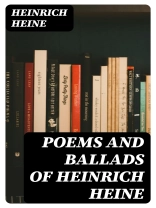Heinrich Heine’s ‘Poems and Ballads of Heinrich Heine’ showcases a lyrical mastery that intertwines romantic fervor with incisive social commentary. This collection reflects Heine’s distinctive blend of personal introspection and sharp satire, characteristic of the German romantic tradition yet vividly aware of the political realities of his time. The poems traverse themes of love, loss, and identity, employing a musicality and brevity that invite readers into the depths of human emotion while eliciting profound reflections on society. Heine’s innovative use of imagery and juxtaposition enhances the emotional intensity, making each verse resonate with timeless relevance. Heinrich Heine, one of the most significant figures in German literature, was deeply influenced by his experiences as a Jewish intellectual in 19th-century Europe. His writings often reflect the tensions between cultural heritage and modernity, as well as a longing for social justice. Heine’s background, including his interactions with the Romantic movement and subsequent exile, profoundly shaped his worldview, imbuing his poetry with a nuanced understanding of love’s dual nature—both uplifting and destructive. Readers who seek a profound exploration of the human condition, coupled with historical and cultural insights, will find Heine’s ‘Poems and Ballads’ an indispensable addition to their literary repertoire. His poignant verses resonate with universal themes that continue to echo through time, inviting contemplation and fostering a deeper appreciation for the complexities of love and identity.
Tentang Penulis
Heinrich Heine (1797-1856) was one of the most significant German poets of the 19th century. He was also a journalist, essayist, and literary critic. Heine’s work is characterized by his lyrical, emotive language, biting satire, and ironic wit. Born into a Jewish family in Düsseldorf, he converted to Protestantism in 1825, largely as an expediency to circumvent the career limitations imposed on Jews in Prussia at the time. His collection ‘Book of Songs’ (1827), which includes the ‘Poems and Ballads of Heinrich Heine’, garnered considerable acclaim for blending lyrical and romantic sensibilities with social and political criticism. Heine’s poetry and prose did not shy away from controversial topics and often brimmed with a consciousness of social injustice and a desire for political transformation. His literary style combines classical romantic idealism with a modern, more disillusioned voice, making his work both revolutionary and reflective of the disillusionment of his era. Heine’s influence extended beyond poetry; his travel writings and essays contributed significantly to European thought and literature. Among his notable works are ‘Germany. A Winter’s Tale’ and ‘The Romance of Saxe.’ Despite having lived the last 25 years of his life in France, Heine remained a pivotal figure in the German literary canon. His legacy endures for his intellectual breadth, profound poetry, and the forward-thinking critique embodied in his writings.












